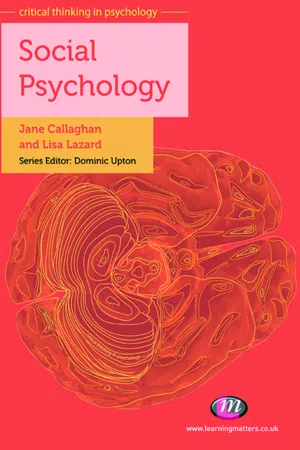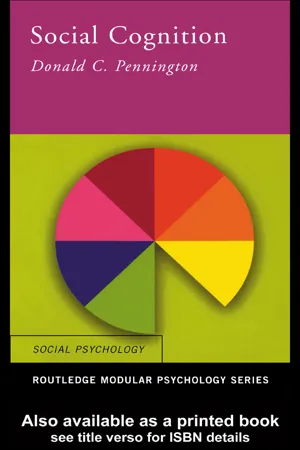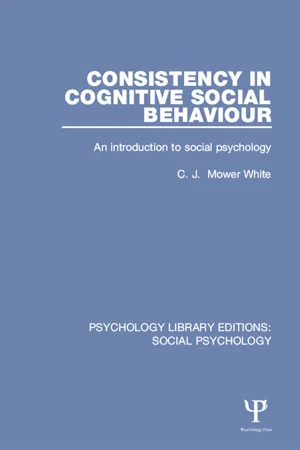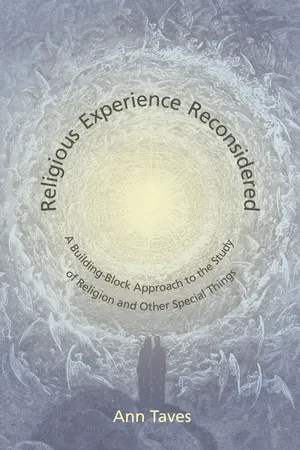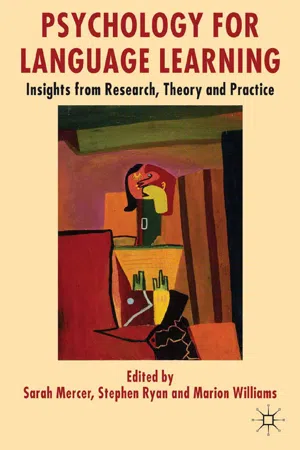Psychology
Attribution Theory
Attribution theory explores how individuals interpret and explain the behavior of themselves and others. It focuses on the reasons people attribute to events and the impact of these attributions on their emotions and behaviors. This theory helps to understand how people make sense of the world around them and how they perceive causality in social situations.
Written by Perlego with AI-assistance
Related key terms
1 of 5
11 Key excerpts on "Attribution Theory"
- eBook - ePub
- Jane Callaghan, Lisa Lazard(Authors)
- 2011(Publication Date)
- Learning Matters(Publisher)
Chapter 2 AttributionsLearning outcomes
By the end of this chapter you should:– have an understanding of classic theories of attribution and attributional processes, which seek to understand how we explain and make sense of our everyday lives;– be able to apply the concept of Attribution Theory to real-life examples;– understand some of the limitations of Attribution Theory, particularly in relation to its mechanistic and individualist terms of reference;– be able to demonstrate an understanding of how we form our everyday explanations of our social world within a complex social context, and understand that such attributions are not just cognitive phenomena in the way that many mainstream social psychological accounts suggest but that they are also socially constituted phenomena;– be aware of concerns about applying abstract theory to important real-life issues (such as criminality);– have had an opportunity to develop your oral communication skills by delivering a presentation, and have developed your critical thinking skills.Introduction
Much of our everyday life is devoted to figuring out why things happen in our social world. Human beings are motivated by a desire to understand, and our understandings of our social experiences are often framed in terms of why questions: Why did that happen? Why did you do that? Why now? Why me? In other words, people can be understood as continually looking for, proposing and explaining the causes of behaviour (their own as well as others’), experiences and phenomena in general. The everyday causal explanations we give to events and actions in our world are described in social psychological theory as attributions. Attribution Theory is generally concerned with explaining and exploring the processes we use to attribute different kinds of causes to particular behaviours and events. In this chapter, we will explore attribution theorists’ attempts to explain why it is that people in general need to know why - eBook - ePub
- J Richard Eiser, Joop van der Pligt(Authors)
- 2015(Publication Date)
- Psychology Press(Publisher)
3 Attribution Theory The question of how we perceive and judge our surroundings involves many issues apart from those considered in the previous chapters. Attribution Theory deals with the perception of causation and the consequences of such perceptions. It is concerned explicitly with how people try to find appropriate causal explanations for one another’s behaviour, and more generally for any event in their social environment. Attributions help us to understand and react to our social surroundings. It matters, for example, whether a person who has been made redundant attributes this to his or her lack of ability, lack of effort, the bias of immediate superiors or the general economic situation. Similarly, it makes a difference whether you see the unexpected, insulting behaviour of a friend as being caused by fatigue or by dislike. In this chapter we discuss three types of attributional theory: theories that focus on the antecedents of people’s perception of the causes of events in their social environment; theories that are based on the assumption that people have preconceptions about causality leading to biases in their attribution; and finally, theories that concentrate on the consequences of attributions. The major theoretical contributions to Attribution Theory have been provided by Heider (1944, 1958), Jones and his colleagues (Jones and Davis, 1965; Jones and McGillis, 1976) and Kelley (1967, 1972, 1973). We will first describe these three theories and some of the research attempting to test them. Heider’s ‘naive’ psychology Attribution Theory is usually traced to Fritz Heider and his attempts to describe and explain ‘naive’ psychology. In The Psychology of Interpersonal Relations (1958), Heider noted a similarity between the goals and activities of scientists and those of people in their everyday lives - eBook - PDF
- Karlfried Knapp, Werner Enninger, Annelie Knapp-Potthoff, Karlfried Knapp, Werner Enninger, Annelie Knapp-Potthoff(Authors)
- 2011(Publication Date)
- De Gruyter Mouton(Publisher)
Attribution Theory and intercultural communication Mansur Lalljee Introduction Attribution Theory is one of the central areas of contemporary social psychology. It takes as its starting point the fundamental tendency of people to seek explanations for events. Explanations serve to give meaning to events, to enable us to apportion praise or blame, and to predict the behavior of other people, and indeed of other events in our environment, and thus enable us to orient ourselves towards the envi-ronment in a coherent manner. However, it is not a theory in the sense of a single systematic set of propositions. Drawing on Fritz Heider's book The Psychology of Interpersonal Relations (Heider, 1958) various authors have suggested a range of different hypotheses to account for different aspects of these issues. Thus, for instance, Kelley (1973) has put forward a number of models concerned with how peo-ple arrive at attributions, whereas others, for instance Weiner (1980), have been concerned with the consequences of attributions. There has been little work explicitly relating Attribution Theory to communication. Lalljee (1981) has suggested that an analysis of interactional processes is crucial for understanding attributions, and a number of studies have now been completed, which support such an orientation. The present paper is not a statement of the main theories of attribution; still less is it a review of literature. Interested readers should refer to the work of Kelley and of Weiner, mentioned above, and to a comprehensive review of the literature by Kelley and Michela (1980). Here it will be argued that understanding attributions is of crucial importance to understanding communication, particularly intercultural communica-tion. Some concepts of Attribution Theory will be elaborated, and some of the research that is most relevant to intercultural communication will be discussed. - eBook - ePub
- Donald C. Pennington(Author)
- 2012(Publication Date)
- Routledge(Publisher)
Causal attributions help us to understand our own and other people’s behaviour. People have a very strong tendency to provide a causal explanation for virtually any act or behaviour —quite often this is achieved with little conscious thought. Heider (1958) initiated the development of the attribution approach in social psychology. He proposed that the main reason people make causal explanations is to help them predict and control their social worlds. If we can successfully explain past behaviour, the chances are that the same or similar causes will allow us to predict what people may actually do in future social situations.In this chapter we will consider four important attribution theories: the correspondent inference theory of Jones and Davis (1965), Kelley’s (1967) covariation model, the causal schemata model (Kelley, 1972) and Weiner’s (1979) model of attributions for success and failure. Following this we will look at differences in how attributions are made between individuals and cultures. In Chapter 3 we will consider how people actually attribute causes to events and how errors and biases are often revealed.The basics
Baron and Byrne (1997) define causal attribution as:The process through which we seek to identify the causes of others’ behaviour and so gain knowledge of their stable traits and dispositions. (p. 50)This is a useful definition, but omits to make reference to both the social situation in which the behaviour takes place, and that people are as concerned to explain their own behaviour (either to themselves or other people) as they are to explain other people’s behaviour. Nevertheless, this definition does highlight the fact that causal explanations are made in relation to personality characteristics, traits and dispositions of the individual.Internal and external causes
Consider our first example of the woman killing her husband. Was this caused by some negative aspect of her personality or was it a response to an unendurable situation? In the language of attribution a dispositional (internal) attribution means that the behaviour is best explained by reference to the person’s temperament, personality, emotional state, i.e. something internal to the person. By contrast, a situational (external) attribution means that the behaviour is best understood as a response to pressures exerted by the situation, i.e. something external to the person. A dispositional (internal) explanation for the woman killing her husband could be that she was cold-hearted, hated her husband and had planned to kill him for some time. A situational (external) explanation might focus on the persistent abuse that her husband had shown over the years and that anyone might do the same in this situation. Since the woman was convicted of manslaughter and given a very light sentence, you might reasonably infer that the jury and judge gave greater weight to a situational rather than dispositional set of causes. Notice with this example that the type of attribution made has consequences for how responsible a person is seen to be for their actions. Here the apparent situational pressures were so great that we reduce our perception of the woman’s responsibility for her actions. Figure 2.1 - eBook - ePub
Restorative Theory in Practice
Insights Into What Works and Why
- Belinda Hopkins(Author)
- 2015(Publication Date)
- Jessica Kingsley Publishers(Publisher)
Attribution Theory is a cognitive theory of motivation. The theory states that humans are conscious, rational decision makers. The theory is based on two fundamental assumptions, the first of which is that people are motivated to understand and master their environment and themselves. That is to say, they try to make their environment predictable and controllable. The second assumption is that individuals are naïve scientists, who try to understand the causal determinants of their own behaviour and the behaviour of others.A typical example of the theory in use is when sports players give explanations for their wins and losses. Attributions are made to effort or skill, to the behaviour of the opponents and the state of the pitch or equipment. A fundamental part of Attribution Theory introduced here is bias. Attributions to internal attributes such as effort and skills are more likely following a victory, whereas a loss is more likely to be attributed to problems with the pitch or the referee’s decisions.Social motivation, justice and the moral emotionsWeiner’s theory of interpersonal motivation is an Attribution Theory that distinguishes between the roles of thinking and feeling in determining action. The theory can explain the process individuals go through before giving help to a person who is homeless, attacking someone who has ‘looked at them in the wrong way’ or punishing them because they’ve committed a crime, for example. The theory includes an assumption that the motivation process following an interaction moves from an understanding about cause and perceptions of intent through to inferences about personal responsibility and emotions of anger and sympathy leading to social reactions that might include help-giving, reprimand, aggression and retaliation.Weiner’s attribution approach to motivation and social justice shares the assumption with the criminal justice system that we are responsible for the choices we make, and that these choices lead to actions we undertake freely. Broadly speaking he proposes that: - eBook - ePub
Consistency in Cognitive Social Behaviour
An introduction to social psychology
- C.J. Mower White(Author)
- 2015(Publication Date)
- Psychology Press(Publisher)
In discussing Attribution Theory, this chapter will first consider the basic statements relating to the topic, made by various psychologists (e.g. Heider, 1958; Jones and Davis, 1965; Kelley, 1967). The major concern here has been the conditions under which the cause of behaviour is thought to be the person – his ability, personality, or effort – or else the situation he is in. This concern is echoed throughout Attribution Theory, as will be seen in the following section: that on self attributions. The idea that we need to attribute our own behaviour (i.e. to explain to ourselves why we did what we did), rather than having immediate knowledge of our feelings, characteristics and attitudes can be a little disturbing; nevertheless, if one believes this aspect of Attribution Theory, then it can throw some intriguing light on one’s behaviour. One of the ways in which this aspect of social psychology has attempted to be concerned with applied fields is in the attribution of success and failure. It is apparent that how one attributes the cause of successful behaviour – whether to oneself or to the situation in which it occurred – may markedly affect similar future behaviour. In the same way the attribution of another person’s successes or failures to himself, or to luck, or to environmental causes may affect his future behaviour. This has been introduced into both clinical and educational fields with some advantage, as will be discussed later in the chapter.A final aspect of attribution which will be considered is relevant to all earlier discussions. It appears that an attribution, once made, is seldom abandoned or changed. This so-called ‘primacy effect’ and its implications will be outlined at the end of the chapter. In conclusion, there will be a consideration of the functions of attribution, in terms of evaluation and consistency, and an analogy will be drawn between a layman’s attributions and those of the professional psychologist.2 Basic statements in Attribution TheoryThe major concern in Attribution Theory has been the conditions under which behaviour is attributed to the person as opposed to the situation in which he behaves. The early work introducing this topic was by Heider (1944, 1958) who claimed that people attempt to see the social environment as predictable and therefore controllable. In order to predict the behaviour of another, we look for the conditions which will explain it, such as his ability or his assumed personality, which Heider termed ‘personal causes’ (1958, p.16). Alternatively his behaviour may be attributed to ‘impersonal causes’ such as a different person, or some non-personal event. If behaviour is seen as being controlled by these external or impersonal causes, then attributions in terms of personality traits are less likely to be made. We would be unlikely to describe somebody as ‘opinionated’ if we observe him in a debating chamber, particularly if we know that outside the debate he holds opposite views. His behaviour is more likely to be ascribed to the situation he is in. Heider (1958) claims that the effect of the situation is very rarely fully considered by the layman as the cause of behaviour, because we are biased towards making personal attributions. It is interesting that a similar claim has been made by Mischel (1968) with respect to the way personality theorists have considered the causes of behaviour suggesting that both laymen and psychologists alike have some bias towards making personal attributions. - No longer available |Learn more
- (Author)
- 2014(Publication Date)
- The English Press(Publisher)
________________________ WORLD TECHNOLOGIES ________________________ Chapter-6 Social Psychology Theories a) Attribution Theory Attribution Theory is a social psychology theory developed by Fritz Heider, Harold Kelley, Edward E. Jones, Lee Ross, and Bernard Weiner. The theory explores how individuals attribute causes to events and behavior. Elements of Attribution Theory Developed by Bernard Weiner 1. Locus - location of the cause—internal (dispositional) or external (situational) to the person • Closely related to feelings of self-esteem • If success or failure is attributed to internal factors, success will lead to pride and increased motivation, whereas failure will diminish self-esteem 2. Stability - whether the cause is likely to stay the same in the near future or can change • Closely related to expectations about the future • If students attribute their failure to stable factors such as the difficulty of the subject, they will expect to fail in that subject in the future 3. Controllability - whether the person can control the cause • Related to ambitions such as anger, pity, gratitude, or shame • If we feel responsible for our failures, we may feel guilt • If we feel responsible for our successes, we may feel proud • Failing at a task we cannot control can lead to shame or anger ________________________ WORLD TECHNOLOGIES ________________________ Covariation Theory Developed by Harold Kelley examines how people decide whether an internal or an external attribution will be made. The theory divides the way people attribute causes into two types. • External or situational attribution assigns causality to an outside factor , such as the weather. • Internal or dispositional attribution assigns causality to factors within the person , such as their own level of intelligence or other variables that make the individual responsible for the event. The covariation model has been developed by H. H. Kelley. - eBook - ePub
Religious Experience Reconsidered
A Building-Block Approach to the Study of Religion and Other Special Things
- Ann Taves(Author)
- 2009(Publication Date)
- Princeton University Press(Publisher)
1 Attribution theories, in other words, take subjects' explanations of events as the focus of their research and attempt to explain why subjects explain things the way they do. These theories presuppose a distinction between commonsense (person on the street, folk, or naïve) explanations offered in the context of everyday human behavior, including the everyday behavior of scientists, and scientific explanations subject to experimental verification. Attribution theories thus provide a way to take subjects' descriptions of their experiences and the explanations they build into their descriptions with utmost seriousness, while at the same time distinguishing between the subjects' explanations and the researchers' explanations of their explanations.Explaining why people explain as they do in scientific terms is not the same as explaining why something happened in scientific terms. Psychologists who study processes of attribution might ask, for example, “under what circumstances individuals (subjectively) believe that their exam performance was caused by intelligence (or lack of),” but not “how intelligence influences exam performance” (Försterling 2001, 3–4). By extension, research on religious attributions might ask under what circumstances individuals (subjectively) believe that an event was caused by a supernatural agent, for example, God, but would not ask how God influences events.The two questions about intelligence do not exactly parallel the two questions about God, however. While there are scientific ways to assess how intelligence influences exam performance, there is no way to scientifically assess how God influences an event. While both questions about intelligence can be investigated scientifically, only one of the questions about God can be. The two questions about God thus map the distinction between studying religion and doing theology, such that questions about religious attributions can be subsumed within an experimental framework, while theological questions cannot. Whether or not researchers are able to provide experimental evidence to show that consciousness is separable from the brain, a more sophisticated understanding of when and why people attribute seemingly special events to religious or religion like causes promises to advance our practical understanding of the way experience is understood in everyday life. - eBook - PDF
- Terry B. Gutkin, Cecil R. Reynolds(Authors)
- 2012(Publication Date)
- Wiley(Publisher)
Applications of Attribution Theory to Consultation and Therapy Particularly relevant to school psychology are Attribution Theory applications to school-based interventions. Early studies (Martin & Curtis, 1981; Smith & Lyon, 1986) demonstrated tendencies for school-based consultants to hold consultees responsible for negative consultation outcomes. Other studies have found little relationship between teachers’ attributions about children and their desire to seek consultation (Hughes, Barker, Kemenoff, & Hart, 1993) and use instructional practices (Bibou-Nakou, Kiosseoglou, & Stogiannidou, 2000). A second area is the impact of attributions on client change in therapy. Sandoval and Davis (1992) described how many therapy models aim to increase clients’ sense of internal causation rather than relying on tendencies to externalize blame. SOCIAL COGNITION A key topic in social psychology is social cognition, which is defined as how people think about their social behavior and that of others (Fiske & Taylor, 1991). Research has shown that impressions of others are formed quickly, automatically, and without much conscious thought. This is done through the use of schemas that help organize information about the social world, access it, and use existing information to respond to new information. Schemas allow one to go beyond the social information given in a specific instance and generate hypotheses and additional items of information that may have important implications for behavior toward a social object. Understanding schemas is particularly relevant to school psychology because schemas are invoked whenever judgments are made about social groups. These groups may include students with special education labels, individuals differing in race, gender, or ability level, or members of certain social groups such as gangs. - eBook - PDF
Psychology for Language Learning
Insights from Research, Theory and Practice
- S. Mercer, S. Ryan, M. Williams, S. Mercer, S. Ryan, M. Williams(Authors)
- 2012(Publication Date)
- Palgrave Macmillan(Publisher)
7 Attribution: Looking Back and Ahead at the ‘Why’ Theory Pei-Hsuan (Peggy) Hsieh Introduction Motivation is generally acknowledged as a key determinant of successful outcomes in learning. However, simply acknowledging the importance of learner motivation does not allow us to understand fully how learn- ers develop motivation and how we can help them sustain that level of motivation. In order to understand motivation more fully, it is impor- tant to explore some of the factors that contribute to an individual’s desire to learn and achieve. One of these is learners’ attributions. In this chapter, I first outline what is meant by Attribution Theory before focusing on attributions in foreign language learning. I then look at different approaches to research in the field, and present a current research study into the attributions for success and failure of 500 students studying Spanish, French, and German in the USA. An overview of Attribution Theory From a constructivist perspective on learning, learners try to understand their world by actively attaching meanings to their learning situations (White, 1959; Williams & Burden, 1997). They often form beliefs about their capabilities to complete tasks successfully and these perceptions play an important role in their actions, motivation, and achievement (Bandura, 1977; Schunk, 1991; Weiner, 1985). One perspective that has contributed substantially to an understanding of students’ motivation to learn is Weiner’s (1976, 2000) Attribution Theory. Attribution Theory represents an attempt to discover how individ- uals perceive the causes of their behaviour and to look at the ways in which their beliefs may affect their motivation and achievement 90 Pei-Hsuan (Peggy) Hsieh 91 (Fiske & Taylor, 1984). The attribution process begins as follows: at many points in their lives, individuals succeed at some things and fail at oth- ers and, thinking back about their experiences, they ask themselves why success or failure occurred. - eBook - ePub
Expectations and Actions
Expectancy-Value Models in Psychology
- Norman T. Feather(Author)
- 2021(Publication Date)
- Routledge(Publisher)
It now appears that a general theory of motivation has evolved from this work and that success-failure manipulations merely provided a research site for the initial investigations. In the present chapter this general conception of behavior is elucidated. I first examine the theory as it applies to achievement strivings, for the achievement arena remains the focus of the conception. The discussion of achievement embraces diverse topics, such as skill versus chance settings, self-concept maintenance, reinforcement schedules, risk-preference, and behavioral change programs. Then additional areas of psychological research that document the range of the conception—hyperactivity, mastery, parole decisions, affiliation and loneliness, and depression—are presented.THE SEARCH FOR CAUSES
A basic assumption of Attribution Theory, that sets it apart from pleasure-pain theories of motivation, is that the search for understanding is the (or a) basic “spring of action.” This does not imply that humans are not pleasure seekers, or that they never bias information in the pursuit of hedonic goals. Rather, information seeking and veridical processing are believed to be normative, may be manifested in spite of a conflicting pleasure principle, and, at the least, comprehension stands with hedonism among the primary sources of motivation (see Meyer, Folkes, & Weiner, 1976).In an achievement setting such as the classroom, the search for understanding often leads to the attributional question of “Why did I succeed or fail?” or, more specifically, “Why did I flunk math?” or “Why did Mary get a better mark on this exam than me?” But classrooms are environments for the satisfaction of motivations other than achievement. Thus, attributional questions also might pertain to, for example, interpersonal acceptance or rejection, such as “Why doesn’t Johnny like me?”Among the unknowns of this attributional analysis is a clear statement of when people ask “why” questions. It has been demonstrated that this search is more likely given failure (rejection) than success (acceptance) (Folkes, 1978). Furthermore, it is plausible to speculate that unexpected events are more likely to lead to “why” questions than expected events (Lau & Russell, 1978), and that subjective importance also will influence the pursuit of knowledge. Thus, frustration, dissonance, and centrality are likely precursors of the attribution process (see Wong & Weiner, 1981). Finally, it has been demonstrated that during task performance “failure-oriented” or “helpless” students especially tend to supply attributions (Diener & Dweck, 1978). Diener and Dweck also intimate that a subset of students, called “mastery-oriented,” do not engage in attribution making. However, I suspect that attributional inferences often are quite retrospective, summarize a number of experiences, take place below a level of immediate awareness, and are intimately tied with self-esteem and self-concept. Thus, I believe that attributions are supplied by the “mastery-oriented” children as well, although not necessarily during or immediately following all task performances.
Index pages curate the most relevant extracts from our library of academic textbooks. They’ve been created using an in-house natural language model (NLM), each adding context and meaning to key research topics.
